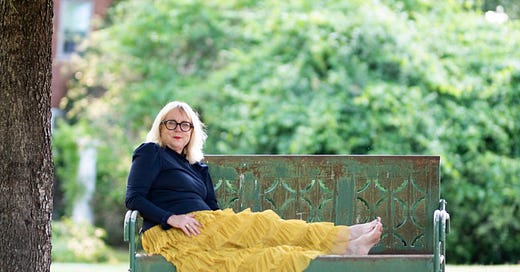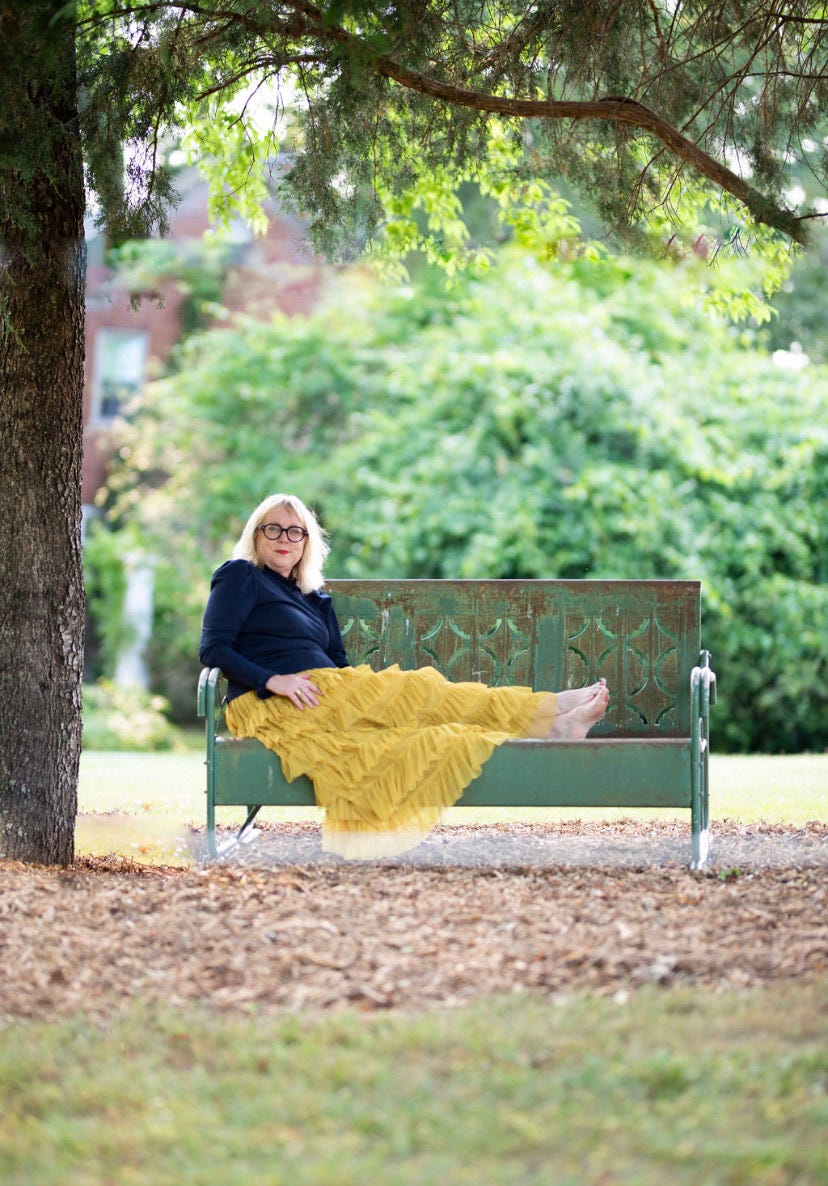I am the Prioress of My Soul
Today marks the first day of my unemployment. How will I devote my time?
"Absolutely unmixed attention is prayer.” – Simone Weil[1]
Welcome to The Priory.
Today marks the launch of my new (hopefully, weekly) newsletter.
Not coincidentally, it also marks the first day of my unemployment.
It’s the first time I’ve been unemployed since I was 17 years old. (Well, except for that one time when I was 18 and was fired from my waitressing job at a pancake house.[2])
But now I’m 58—truly, the worst absolute worst age to be unexpectedly unemployed: too young to retire, too old to start all over again, or to start much at all.
But starting I am.
Starting this newsletter, for one thing.
And, alongside this, I aim to start a new stage of life that is more reflective, more rested, more beautiful, more focused on the good and the true.
Truth be told, I am wounded. Wounded beyond the words I have to express it. (I know many others are, too. Maybe even you.)
I am also healing. I will heal. But I also need to allow the process, and own it. I need to give myself time and space for that process. (Perhaps you do, too.)
Healing has meant therapy. It’s also meant surrounding myself with the people who’ve known me and loved me for a long time, long before I became (as one of my dear friends likes to say it) KARENSWALLOWPRIOR. It’s also meant reading. Voracious reading, at my whim, for my pleasure, for myself. I can’t seem to stop reading long enough to get my work done. (With profound apologies to any of my editors reading this!)
Not only is 58 the worst age to be unemployed, but being unemployed in academia is even worse, and being unemployed in the field of English in this culture-wars-climate is worst of all. (If you don’t believe that, just google the news headlines.)
So, if I ever could “make it” as a full-time writer, I guess there is no better time than now to try.
Writing this newsletter is part of this experiment. More importantly, it is part of my practice of devoting my time to better, deeper things.
This stage of life will be for me—who knows for how long?—an intentional sort of retreat. And I mean “retreat” in all senses of the word.
“Retreat” is a noun. A retreat offers a place (or time) of rest, reflection, and refreshment. And there is nowhere I gain these things more than at home. Here at home, I hope to read more, write more, rest more. (I will still be traveling to speak and teach. You can keep up-to-date on my schedule here.)
As a verb, “retreat” means to draw back or to withdraw. And I am doing that. I expect I will withdraw to some degree from the cultural and political battles that have defined my corner of the church (and my life) for so long. By no means will I ignore injustice or wrong. (I couldn’t, even if I wanted to, given my nature.) But, as Harvard professor Elaine Scarry argues, attending to beauty doesn’t diminish justice — it cultivates it.[3] So here’s to truth, goodness, beauty, and justice.
I’ve dubbed this newsletter The Priory because, well, if you’ve read this far, you have probably already guessed.
Not only is The Priory a fun little play on my name,[4] but it’s also the perfect title to capture what I want this new season centered in my home to be like.
A priory is a monastery or convent governed by a prior or a prioress. In ages past, women who entered convents were not only young, virginal ones, such as Shakespeare’s tragic Ophelia (“Get thee to a nunnery!” Hamlet ordered her in vain.) Lesser known is that convents were also refuges and repositories for rebellious, disabled, abandoned, and betrayed[5] women, too. (Which kind I am depends on whom you ask.)
I daresay the world has changed in many ways for women since the medieval days in which convents loomed large.
But some of the dynamics really have not.
Since 2015, I have been publicly slandered, harassed, and trolled by a handful of pastors in my denomination. One of these men has since been arrested for charges related to drug abuse and domestic violence. Another—who declaimed me by name from the floor of a national convention—was later arrested for domestic assault. Another is a self-admitted wife abuser who has merely changed the targets of his abuse and called it repentance. At this point, I’ve stopped counting. Abusers are going to abuse. No way around that. My abuse is so little compared to what too many have gone through. But what cannot be abided or excused is the supposedly “good, godly” leaders who have paid too much attention to such abusers for too long and given their voices any hearing at all.
Somewhere along the way, I, too, sold too much of my attention for a measly bowl of stew. And the stew was rancid. As I meme I saw the other day put it, “God has removed you from a table where you used to sit … in order to save you from a host that was serving you poison.”
I am going to work on getting a lot of things back. But, mainly, I am going to work on getting my attention back. On directing my devotion to things more worthy of it. The poet Mary Oliver wrote in one of her essays, “Something is wrong, I know it, if I don’t keep my attention on eternity.” Then she concludes the essay with this famous line: “Attention is the beginning of devotion.”[6] Now, in this season of unemployment self-employment, I am choosing to govern my time, my work, and most of all—my attention—in better and more beautiful ways.
After all, I am the prioress of my soul.
(Which reminds me: I will definitely have to write about the delightful Prioress from Chaucer’s Canterbury Tales in a future post!)
Governing the soul well means, among other things, paying attention to what we pay attention to.
We live today in what is called an attention economy. Billions of dollars are generated simply by getting—and keeping—our attention, whether through the click, the like, the share, the retweet, or the substack subscription (!). It’s not all bad, of course, this glut of information made possible by the digital age. A great deal of it is even good (I hope!).
If, as the quote from Simone Weil at the start of this post suggests, attention is prayer, then what we pay attention to will direct not only the content of our prayers but the pull of our lives, too. “Attention, taken to its highest degree, is the same thing as prayer,” Weil says. “It presupposes faith and love.”[8]
“If we turn our mind towards the good,” Weil writes, “it is impossible that little by little the whole soul will not be attracted thereto in spite of itself.”[7]
Weil (1909-1943) was a French philosopher, activist, and mystic whose ideas resist most political, theological, or religious categories. Born to Jewish parents[9] and raised an agnostic, Weil was drawn to Christianity over the course of her life, a life shortened by tuberculosis and her extreme asceticism. (I will share more about Weil and her Christian mysticism in next week’s newsletter.) One scholar of Weil’s life and work describes Weil as “the patron saint of anomalous persons”:
She is relentlessly anti-ideological, and gives judicious guidance for resisting the pull of narcissism. She invites us to act in the world, and to identify and eliminate the hypocrisies that tarnish almost everyone. Stressing the urgency to write, think and, most importantly, do, her life can inspire fictions, poems, songs, images and political action. She serves as a muse for those who are open to her mystery. Above all, in a society whose most distinct feature is alienation, Simone Weil proposes ways to feel at home again in a place that has become strange.[10]
I’m no saint. But I do feel at home with anomalous persons.
Perhaps you, dear reader, do, too?
****
[Photo Credits: The photos on this post and my home page are by the lovely and talented Ashlee Glen.]
[1] Simone Weil, Gravity and Grace, trans. By Emma Crawford and Mario von der Ruhr (London: Routledge, 2002), 117.
[2] I was 18 years old, and I felt so grown up when I went to the unemployment office, like I was living in the real world, seeing how people outside my Pollyanna life lived. I pretty quickly got hired at Howard Johnson’s, though, so my period of being down and out was short-lived. This experience of unemployment is a whole other thing altogether. I have an entirely new understanding of “down and out” that seems more devastating and revelatory than standing in the unemployment line. (There really was a line!)
[3] Elaine Scarry, On Beauty and Being Just (Princeton: Princeton University Press, 2001).
[4] This was also the name of my space for a while over at Think Christian when I wrote regularly there back in the day. Check them out. They do good work.
[5] Betrayal trauma is a thing: just watch this, then this. It’s powerful, truthful stuff.
[6] Mary Oliver, Upstream (New York, NY: Penguin, 2016), 7, 8.
[7] Weil 117.
[8] Weil 117.
[9] Weil and her family fled their home when Hitler’s forces invaded France.
[10] https://aeon.co/essays/why-simone-weil-is-the-patron-saint-of-anomalous-persons





I am sorry you went through betrayal trauma, Karen. Yes, it IS awful. When we met in D.C. in 2018, I was in the middle of the end of a 36-year marriage. The quote about how “God has removed you from a table where you used to sit..." resonates.
I am praying that this new start which is undergirded by retreat will be marked by comforting stability. I'm in a similar season, reorienting priorities (look at the root of that word!), considering what is truly of value in this season of life and moving forward.
I know 58 seems like a late in life time to start over, but I have been inspired by many women who have begun new adventures when they were, ahem, more mature. I went back to college in my 50s after being a homeschool mom to 10, getting my undergraduate degree online from Liberty University (ha, ha!), then my Master's degree from a seminary, finally getting licensed as a marriage and family therapist at 59. I've had a private practice for 2 1/2 years and just finished teaching human sexuality to graduate students preparing to become therapists at a local Christian university. Imagine that...I only got a college degree a few years ago, and I designed and taught a Master's level college course! It's ridiculous, in the best way.
You got this. Lots of people are rooting for you.
I feel I’m standing on holy ground here, Karen. If this essay is an indication of things to come, we’re all in for an enlivening transformation. The world needs your clean, strong, uplifting voice. And a greater percentage of the world will now hear it. Grateful!